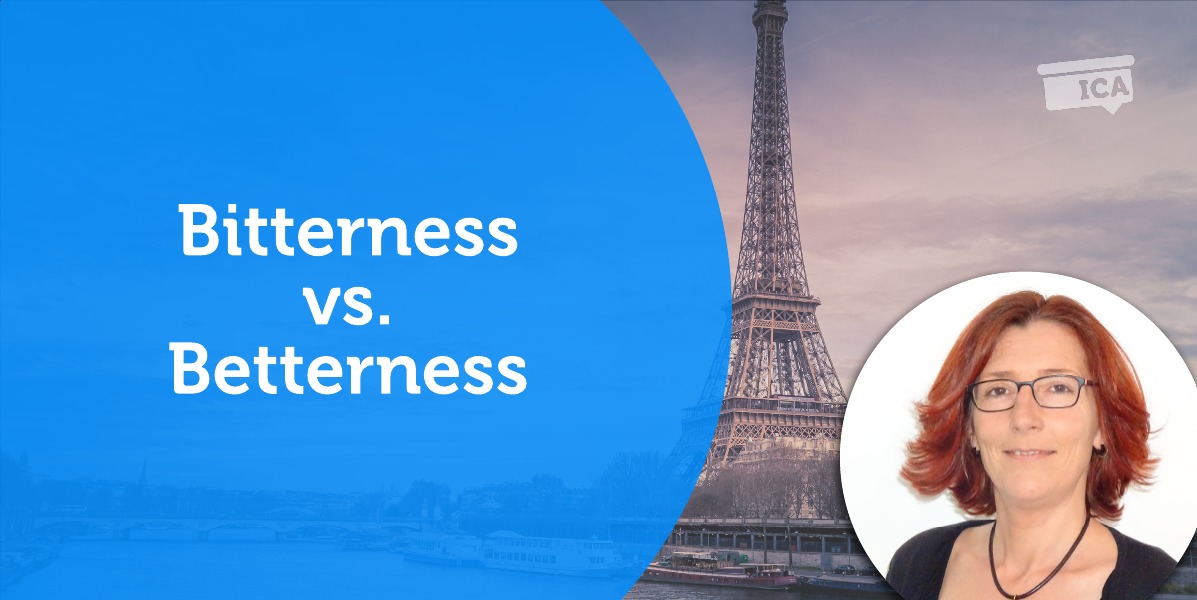
A Coaching Power Tool Created by Sylvie Carriere
(Life Coach, FRANCE)
Everything can be taken from a man but one thing: the last of the human freedoms—to choose one’s attitude in any given set of circumstances, to choose one’s own way. ~Viktor Frankl
This assignment came to me as I was recalling some events from my separation and subsequent divorce with a friend earlier this year. To me, this conversation just seemed like a series of anecdotes from my past but suddenly, my friend asked « I remember feeling so angry when you were telling me about this at the time! How did you do it? You never once exploded or got into a fight! »
I WAS angry; I wanted to explore and get into a fight, but I chose not to. I had vowed to do everything in my power to make this transition as smooth as possible for our son’s sake and I stuck to my guns.
It took two years for me to realize the benefits of such a decision. Channeling your emotions and focusing on a way forward for yourself rather than letting your frustrations take over not only can save you from feeling resentful about a situation, but it can also allow you to make some great life-changing decisions.
Anyone who experiences a change of circumstances, whether it is choosing or imposed, has a choice between one of 2 directions: getting bitter or getting better.
Bitterness
Being bitter means feeling or showing anger, hurt or resentment because of bad experiences or a sense of unjust treatment.
Synonyms include: resentful, aggrieved, disgruntled, grudge-bearing, indignant, rancorous, spiteful, jaundiced, sour, morose, with a chip on one’s shoulder
Bitterness often supplants another emotion such as fear, anger, sadness; it stems from the limiting belief that what is happening to us is unfair, that we have wronged and that there is nothing we can do about it.
In bitterness, we get stuck; we do not look for a way forward. We may use blame to justify our situation (« I have good reasons to be bitter ») and we may even use bitterness for revenge.
We often deal with it by denying, rejecting, or repressing our emotions.
Bitterness is a destructive feeling; it makes us negative, critical and unpleasant to the surrounding people. It prevents us from appreciating the present moment. If not addressed, it will eventually define us and it will convince us that nobody can understand how we feel.
In the long run, not only will it leave us empty and lonely but it may also lead to sickness, serious illness, and sometimes premature death.
Betterness
Getting better means to improve and also to heal.
Getting better doesn’t mean we should ignore or suppress our negative emotions. We have to know of them and to explore them with clarity to choose how to respond to them in the most constructive and effective way possible.
We have a natural tendency to be positive and optimistic or negative and pessimistic. We also find it easier to turn good positive thoughts into bad ones rather than to turn bad negative thoughts into good ones.
However, we have the power to rise above our difficulties and become better. With practice and determination, we can switch from the victim’s point of view to the victor standpoint and reframe our perspective accordingly. This process allows us to grow and achieve things we didn’t think ourselves capable of.
Getting better means being able to deal with change and adapt to it and sometimes making the best of a bad situation.
Self-application
We all go through moments in life when a situation or a person’s behavior seems so unfair or undeserved to us we become angry and upset to where we cannot get past those feelings and we harbor resentment. Bitterness is an easy trap to fall into…
So how do we move from bitterness to betterness?
The very first step that will engage us on this journey is to recognize our feelings of bitterness and accept them. Whether they are just creeping up or have been present for some time, we cannot do anything about them until we feel and understand them.
It is also important to understand that whatever we do in life results from our choices, whether they are conscious. It may be difficult for us to admit, but, even though we do not do it on purpose, we feel angry and frustrated by a negative experience, just as much as we move past it, focus on a way forward and take the necessary steps to succeed.
With a lot of practice and a few tools, we can learn to make the choices that keep us away from bitterness.